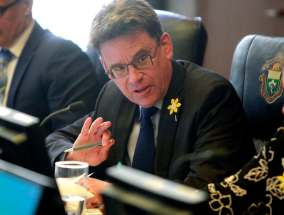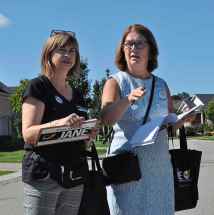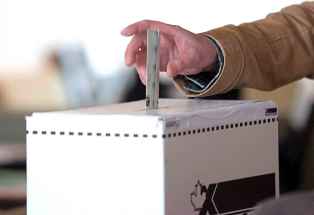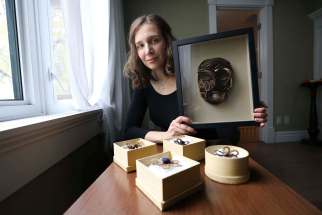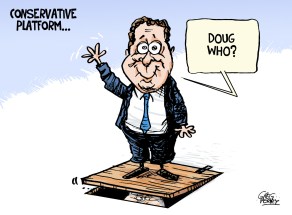A mission to matter Exiled former star cabinet minister Jane Philpott is determined to win re-election as an independent candidate in her Toronto-area riding to represent constituents, not party politics
Read this article for free:
or
Already have an account? Log in here »
To continue reading, please subscribe:
Monthly Digital Subscription
$0 for the first 4 weeks*
- Enjoy unlimited reading on winnipegfreepress.com
- Read the E-Edition, our digital replica newspaper
- Access News Break, our award-winning app
- Play interactive puzzles
*No charge for 4 weeks then price increases to the regular rate of $19.00 plus GST every four weeks. Offer available to new and qualified returning subscribers only. Cancel any time.
Monthly Digital Subscription
$4.75/week*
- Enjoy unlimited reading on winnipegfreepress.com
- Read the E-Edition, our digital replica newspaper
- Access News Break, our award-winning app
- Play interactive puzzles
*Billed as $19 plus GST every four weeks. Cancel any time.
To continue reading, please subscribe:
Add Free Press access to your Brandon Sun subscription for only an additional
$1 for the first 4 weeks*
*Your next subscription payment will increase by $1.00 and you will be charged $16.99 plus GST for four weeks. After four weeks, your payment will increase to $23.99 plus GST every four weeks.
Read unlimited articles for free today:
or
Already have an account? Log in here »
Hey there, time traveller!
This article was published 11/10/2019 (2256 days ago), so information in it may no longer be current.
STOUFFVILLE, Ont. — On a sunny September afternoon, independent candidate Jane Philpott gets ready to knock on doors.
She’s expecting pushback.
Philpott is seeking re-election in this swing Toronto-area suburb, which swept her to power as part of Justin Trudeau’s 2015 Liberal wave.
“This is one of the few (areas) I actually lost; they tend to be a little older, a bit more to the right,” she says from the passenger seat of an SUV.
Philpott, a medical doctor, had enjoyed a meteoric rise in Trudeau’s government, and was widely seen as his most competent minister — first in health, then Indigenous services and, finally, as Treasury Board president — helping steer high-profile cannabis legalization and addressing drinking water on First Nations.
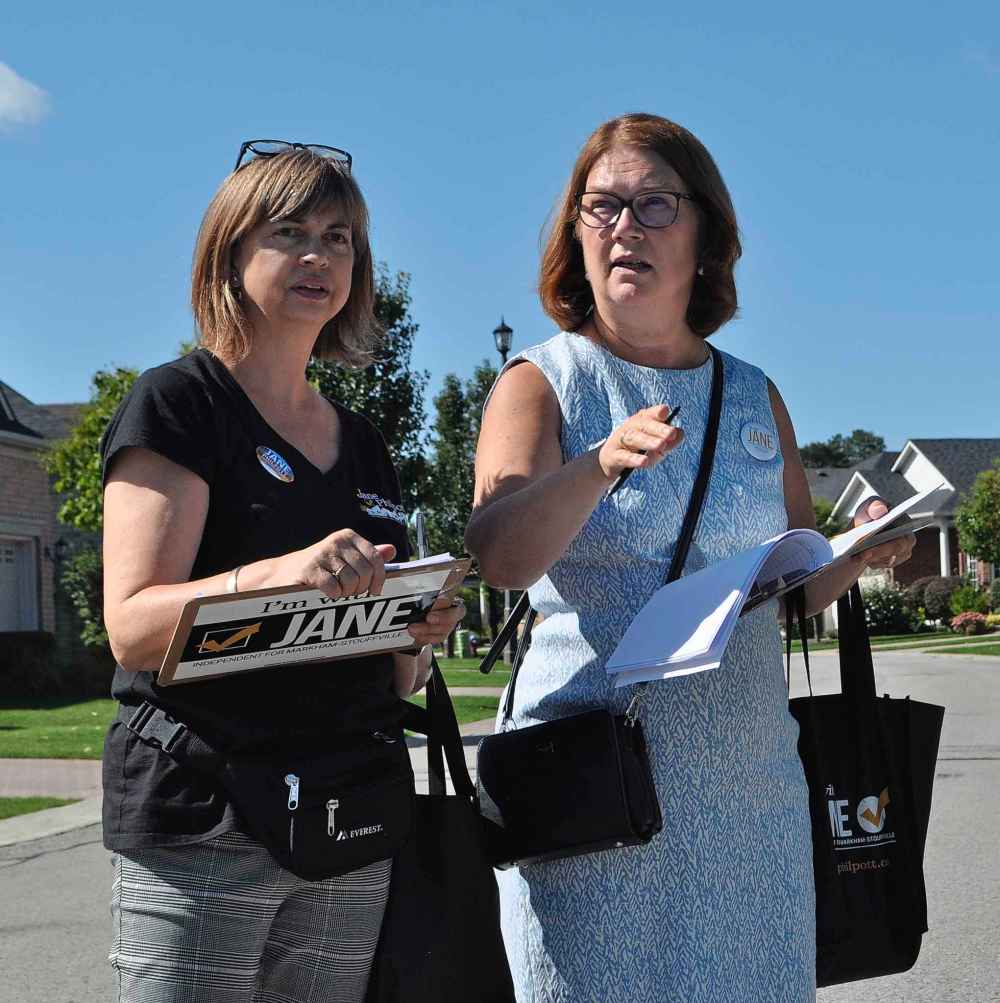
It all came to a crashing end in March, during the SNC-Lavalin scandal, when she resigned from cabinet, alongside former attorney general Jody Wilson-Raybould. Shortly after, Trudeau booted the two renegades from the Liberal caucus.
So, instead of the black sedan and driver made available to cabinet ministers, Philpott steps out of her constituency manager’s red Ford Edge and knocks on the first door on this street.
An elderly man clenching a ventilator opens the door. “Oh, it’s you,” he says. “I’m a conservative but I might vote for you. I’m so fed up about politics.”
“So am I these days,” Philpott says with a laugh.
Philpott and Wilson-Raybould are on a mission to reshape Canadian politics, trying to reverse a decades-long trend of power being concentrated in party leaders’ offices. Many see it as a long shot.
“I wouldn’t be running if I didn’t think this was possible,” Philpott says.
•••
The two former pillars of Trudeau’s cabinet have been divisive figures in Ottawa ever since the SNC-Lavalin situation played out.
In August, the ethics commissioner found Trudeau broke the rules by attempting to pressure Wilson-Raybould to intervene in the criminal prosecution of the Quebec engineering giant on corruption and bribery charges.
Yet many Liberal staffers describe the pair as conniving or, at best, naive for believing they could air the party’s dirty laundry and not be catapulted out of caucus.
Many accuse the two of trying to help the Tories, by undercutting Trudeau’s brand on feminism and reconciliation.
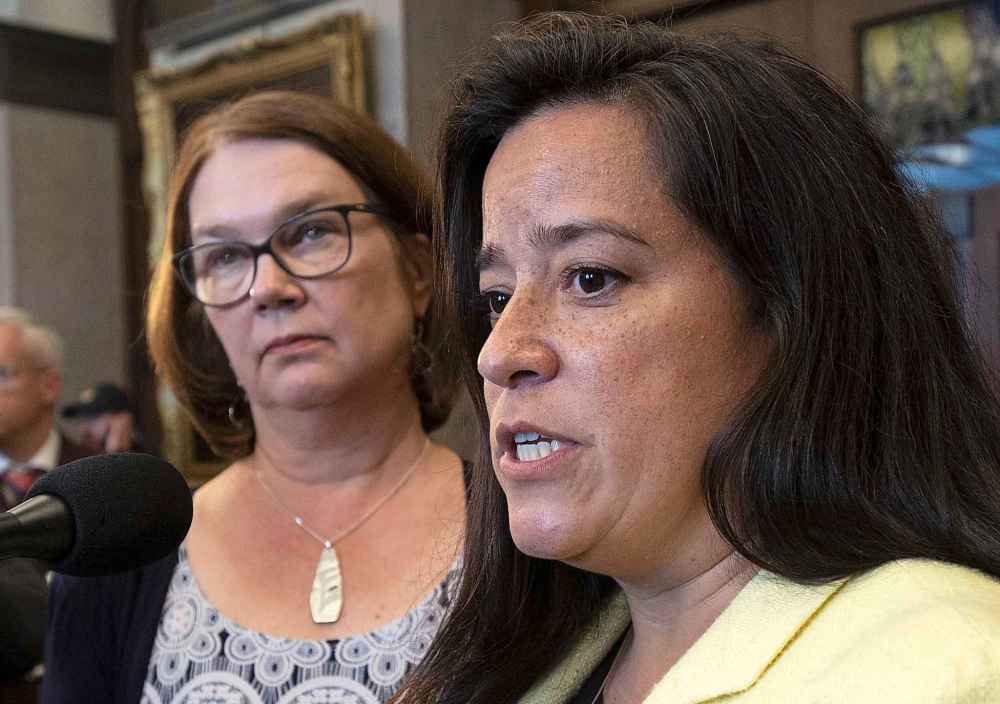
Some in the party have even quietly questioned Philpott’s mental well-being for going along with Wilson-Raybould.
To her, that illustrates a cult-like mentality towards parties.
“I teach my kids to do what’s right, and when it was time for me, well I had to do that,” she explains to a constituent, a retired schoolteacher.
“You’re great; you’re the best person running. You should win — but I don’t know if you will,” the woman says. “I think you jumped on the bandwagon a little too quickly. You have to look out for yourself.”
•••
In interviews with exiting MPs, the nonprofit Samara Centre for Democracy has found many were surprised by the amount of centralization and party control when they got to Parliament Hill.
Participating on principle
OTTAWA — A group of Winnipeg doctors are among hundreds of Canadians from afar who have been actively supporting Jane Philpott and Jody Wilson-Raybould.
“It is important to demonstrate that politics can be done differently,” says Adrienne Morrow, a physician.
Morrow spent five years splitting her time between teaching at the University of Manitoba and service as chief of staff at Norway House Cree Nation’s health centre, where she met Philpott as health minister in 2016.
OTTAWA — A group of Winnipeg doctors are among hundreds of Canadians from afar who have been actively supporting Jane Philpott and Jody Wilson-Raybould.
“It is important to demonstrate that politics can be done differently,” says Adrienne Morrow, a physician.
Morrow spent five years splitting her time between teaching at the University of Manitoba and service as chief of staff at Norway House Cree Nation’s health centre, where she met Philpott as health minister in 2016.
With no proper birthing unit, pregnant women were being billeted to Winnipeg and Thompson alone — only patients considered medically high-risk could have an escort.
That led some to hide their pregnancies and skip regular health appointments in order to instead have their baby in the reserve’s general health centre.
Residents had raised the issue for years, but Morrow had a chance to bring it up with Philpott, who ended up convincing her government to change the policy in the next budget.
During the SNC-Lavalin scandal, when Philpott announced she’d be running as an independent, Morrow flew to Toronto and showed up unannounced for the first door-knocking session on June 1.
“She is somebody who was really willing to put integrity ahead of her own career as a politician and take a stand for what she believed to be the right thing to do,” Morrow says.
Morrow later accompanied five of her friends willing to canvass for a day as part of a girls’ weekend in Toronto.
“There’s something that people want to say in their support,” says Philpott who, along with Wilson-Raybould, has the support of donors and volunteers from afar.
“It’s not about the (candidate.) It’s that they believe either that politics is becoming too toxic or too partisan or too antagonistic and they want to support somebody who’s presenting an alternative,” Philpott says.
— Dylan Robertson
It’s a trend that has gradually worsened over five decades, Samara research director Michael Morden says.
“There are a lot of MPs who have pent-up frustration with the way they feel parties are blocking their opportunity to do their jobs effectively,” he says.
To him, “this strong instinct in Canada to snuff out any and all dissent” is an anomaly, compared with similar parliamentary systems in Britain, Australia and New Zealand.
Up until the ’60s, MPs saw their primary role as representing constituents and sharing an overarching vision with their party.
Now, whenever MPs aren’t in lock-step with the party line, it makes headlines.
“That’s totally healthy; it doesn’t necessarily have to look bad if we decide it doesn’t look bad,” Morden says.
•••
In April, Trudeau sent Philpott and Wilson-Raybould packing after a meeting with Liberal MPs. His caucus didn’t have a vote, despite provisions that would have allowed one.
That illustrates the issue with centralized power, says University of Toronto political science professor Chris Cochrane.
“To have rank-and-file MPs denigrated to basically toeing the line,” he said. “It’s not at all how our system of government functioned in its early decades, or was ever intended to,” he says.
Cochrane argues it creates a self-fulfilling prophecy.
“Until MPs stand up to the leader and push back to the leader, and until voters start to reward people who do that for the right reasons, we’re likely to end up with the system that I find very few people actually say that they want.”

It remains to be seen whether Philpott’s constituents will take that step.
Aurick John, for one, is leaning toward voting Liberal again.
“Independence is important. If I was in her position, I’d probably do the same thing,” he says. “But she’s not selling herself.”
Around the corner, Karen Johnson is firmly in the Liberal camp.
“I told her, ‘You’ll be a one-woman party,’” Johnson says.
And another man is concerned about toothless representation.
“What if something happens in the riding and you’re just an independent?”
Philpott tells him that as a former cabinet minister, she knows who to reach to get a problem resolved.
“Sometimes in Ottawa, all it takes is knowing the right person to call, and how to raise the issue,” she says, a point she repeats five times over the course of two hours.
About half the constituents who’ve come to the door appear satisfied with her answer.
•••
The Westminster system — the English parliamentary model Canada’s is built upon — was not designed for independent MPs.
Parties undertake the horse-trading around legislation, control who sits on committees and receive budgets for research.
Morden says the most effective way to get more independence in politics is to have MPs within parties who aren’t afraid to rock the boat.
“We need a strong push from MPs within… the caucus itself, which can be self-policing, which can alienate and ostracize someone who is seen to step out of line,” he says.
•••
Philpott is in for a tough fight.
While she appears to have the most lawn signs in the area Friday, some of the people in those houses admit they might vote for her Liberal opponent, longtime local legislator Helena Jaczek.
All MPs face a fundraising cap, but those campaigning under party banners can almost double their budget by receiving party funds. Philpott’s $115,700 cap is $97,000 short of what her five opponents can rake in through their political organizations.
Little appetite for minority ‘messiness’
OTTAWA — It’s unclear whether a minority Parliament would mean more or less independence for MPs.
For weeks, polls have placed the Liberals and Tories in dead heat, with sustained secondary support for the NDP, Green party and Bloc Québécois.
Unless the logjam breaks in favour of one party, it’s likely one of the big two will need the support of at least one smaller party, in a formal or informal coalition.
OTTAWA — It’s unclear whether a minority Parliament would mean more or less independence for MPs.
For weeks, polls have placed the Liberals and Tories in dead heat, with sustained secondary support for the NDP, Green party and Bloc Québécois.
Unless the logjam breaks in favour of one party, it’s likely one of the big two will need the support of at least one smaller party, in a formal or informal coalition.
Such arrangements are propping up the governments of British Columbia and Prince Edward Island.
Green Leader Elizabeth May has mulled that a minority Parliament similar to the turbulent ’60s would be best for Canadians.
Lester Pearson led the country from 1963 to 1968 with two minority Liberal governments, informally leaning on the NDP for support. It was during that time that Ottawa introduced universal health care, student loans and the Canada Pension Plan.
Last month, before the federal writ period, May said she hopes this fall will create a similar result.
“We need bold leadership an in a minority Parliament, ironically, I think it’s more powerful than one one party has all the power,” May said during a taping of the Free Press podcast Not For Attribution.
However, Michael Morden of the Samara Centre for Democracy said it was the chaos of those Pearson years that kicked off the trend of centralized power.
“They got an amazing amount done, but it never looked great politically,” Morden says. Everyone from cabinet ministers to backbench MPs acted more or less independently, he says, which led Pierre Trudeau to consolidate power in the Prime Minister’s Office.
Morden says the consolidation essentially worsened under successive governments, especially in minority parliaments, leading to more partisanship and less MP independence.
Yet he is pessimistic that a minority government this fall would actually give MPs more of a voice, even if it would likely yield better results for Canadians.
“The more recent experience of minority Parliaments in Canada has not yielded that toleration for messiness in the interest of productivity,” he says.
“When you look at the volatility federally and the results we’re seeing over and over again provincially, there are strong indications that we do need to relearn that tolerance.”
— Dylan Robertson
Polling conducted last week for the Philpott campaign shows her at 38 per cent support, compared with 35 per cent for her Liberal challenger, well within the margin of error.
Liberals have dismissed the polling, saying it’s a rookie mistake to suggest to voters you’re bound to win.
Cochrane views cautiously the sample size of 301 voters, but he says the poll numbers are worth noting. They place the Tories at 10 per cent, despite counting 43 per cent last time.
“It would suggest she’s getting a lot of support from Conservatives,” he says.
More important is that 28 per cent of survey respondents who said they’re planning to vote Liberal indicated they’d be wiling to switch, especially if another candidate has momentum.
In Vancouver, pollsters have for months pegged Wilson-Raybould’s riding as a tight race.
“I think both of them actually have a very good chance at winning their seats,” says Cochrane.

Liberal strategists are outwardly skeptical, but quietly they fear the pair would create a constant reminder of Trudeau’s tarnished brand in the House.
That’s exactly what constituent Fred Sauter would welcome.
“I’ve been a Liberal all my life,” says Sauter, 67. He says he’s still surprised Philpott got the boot, saying SNC-Lavalin and Bombardier hold more sway than MPs with principles do.
“I only see my vote getting wasted if I go with the Liberals. I’d rather have someone who believes in what they say.”
Philpott says she owes it to “people that want me to send a message” to give the race her best shot.
“I feel a responsibility to all those people.”
dylan.robertson@freepress.mb.ca
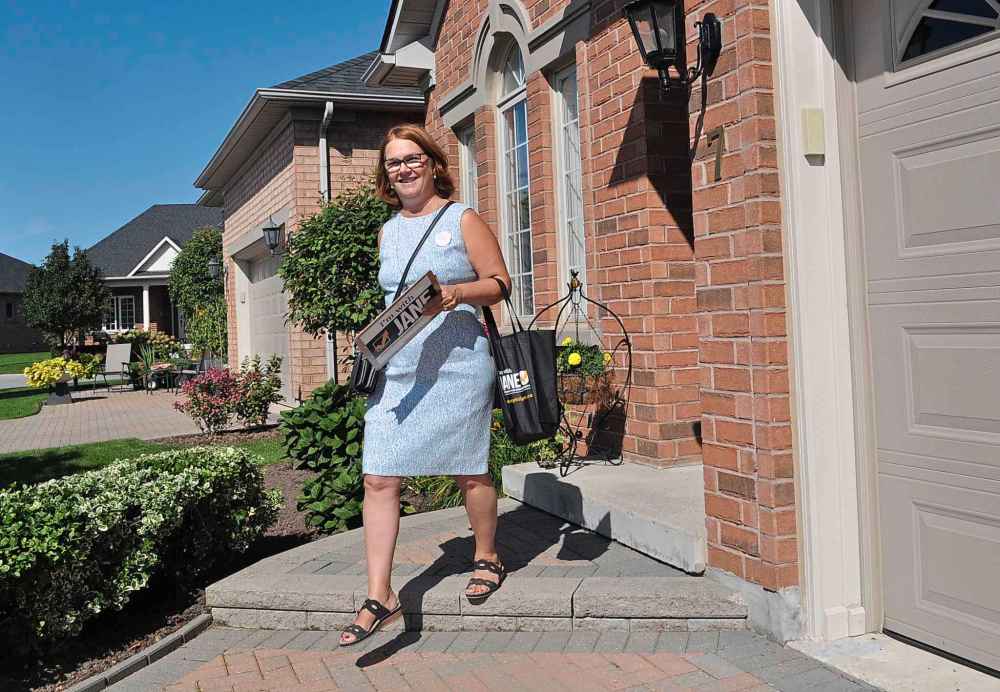
History
Updated on Friday, October 11, 2019 8:26 PM CDT: Fixes typo



